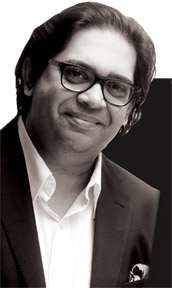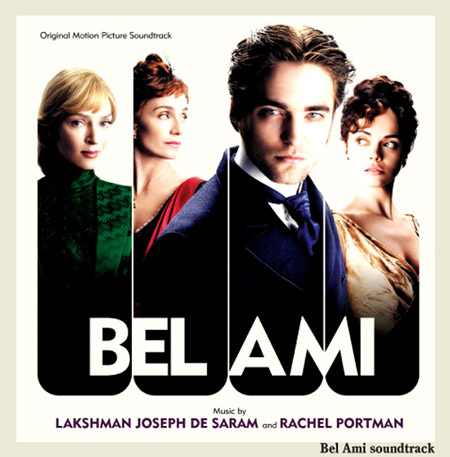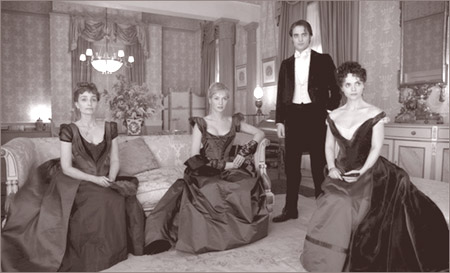Lakshman Joseph de Saram and the music for Guy de Maupassant’s Bel
Ami
By Ranga CHANDRARATHNE
 The cardinal pillars of film music scoring, is the ability of the
composer to illuminate a film with a set of musical motifs, thereby
transforming insights, perceptions and perhaps, drawing out the defining
character of the film. The cardinal pillars of film music scoring, is the ability of the
composer to illuminate a film with a set of musical motifs, thereby
transforming insights, perceptions and perhaps, drawing out the defining
character of the film.
The highly regarded music score for ‘Bel Ami,’ featuring an all-star
Hollywood cast, is an object lesson in understanding the intricacies of
the craft. The score manifests, beyond doubt; the ingenuity and depth of
the language of music, and last but not least, the delicate fusion of
theory and practice in the context of movie scoring.
In an exclusive interview with ‘Montage,’ composer Lakshman Joseph de
Saram spells out the finer points of his music for ‘Bel Ami,’ and his
creative process for writing music for picture.
Question: To begin with the global release of the original soundtrack
of ‘Bel Ami,’ a Columbia Pictures/Magnolia Films release, can you tell
us how you came about writing the music for this highly anticipated
film?
Answer: Historically? Or just the run-up for this particular film?
Q: Historically, briefly?
A: It took more than 10 years of being in the game of scoring
for film to get to the point where I became somewhat eligible to be
considered appropriate for a project like ‘Bel Ami.’ Lots of things had
to click along the way, my imagination, exposure, technique, contacts,
but most importantly, it probably boiled down to that one all-pervading
fundamental people look for in a composer for the moving image, and
that's your ever evolving natural ability to transform a thought, an
insight, a set of circumstances, a face, into some sort of effective,
pertinent musical sound. I had that going for me.
Career
 Q: Before you started your career writing music for feature
films starring people such as Uma Thurman and Kristin Scott Thomas, did
you, like many Sri Lankan's in the industry, get your start by writing
jingles for the local advertising agencies? Q: Before you started your career writing music for feature
films starring people such as Uma Thurman and Kristin Scott Thomas, did
you, like many Sri Lankan's in the industry, get your start by writing
jingles for the local advertising agencies?
A: The advertising industry bypassed me completely.
Q: Was the experience you gained by being a part of the local
Western music scene helpful in getting you to your present level of
international recognition?
A: All experiences, musical and non-musical are helpful in the
creative world, and it’s an evolving process, it has no end.
Q: So then, what advantage did you possess to have been chosen
to work on a film such as ‘Bel Ami,’ and what advice would you give
aspiring filmmakers who would also like a shot at being a creative head
of a big Hollywood film?
Difficult questions
A: These are difficult questions. I have no cut and dried
answers. I’m sure all of us are capable of doing nice things all over
the world; your luck can also play a big role. Advice to aspiring
filmmakers? I have said this many times before, keep grinding,
apprentice with the pros and hone those technical skills.
Q: Did your music on the Venice Film Festival-winning movie
‘Machan’ set you up for ‘Bel Ami?’ The fact that the director of
‘Machan,’ the award winning Uberto Pasolini was also one of the
producers of ‘Bel Ami.’
A: Yes, there is no question that my working with Uberto
Pasolini on ‘Machan’ got me closer to ‘Bel Ami.’ But on the level of a
high profile production such as ‘Bel Ami,’ where you already had four
Oscar winners and nominees on board, a renowned producer such as Uberto
had access to the very best in the world. Ultimately, it was all about
the production getting the right person for the job, nothing personal.
Unique process
Q: Do you have a unique process for scoring for film?
A: I don’t really know, because I am not too familiar with how
other composers go about it. We could all be doing variations on the
same rules.
Q: What are some of those rules?
A: Wow, this is tough, and I think we have touched on this
before, but in a nutshell, can you, the composer, understand like no one
else, the crux, the quintessence of the story at hand, and at the very
top of the game, come up with a musical line that can express cogently
the wordless, gestureless elements of that story. I can go on, but to me
at least, if I am not able to get pass that initial hurdle of
understanding, I go no further.
Q: Is that why you have turned down more films that you have
accepted? Because of a lack of understanding?
|

A scene from the movie Bel Ami |
A: Probably, or because there was too little to understand.
Obviously, you need to be passionate about it.
Q: You are also known to be a very private, reclusive person,
is that a part of your artistic process? The solitude, the aloofness.
A: Not at all, I just don’t like getting around that much, and
sadly, I only happen to have a very small circle of people I hang with
socially, whose pursuits are maybe a little uncommon. That’s what
probably gives you that false sense of aloofness. But the solitude, the
quietness, yes, that’s fundamental, and I am fortunate to have that gift
of being able to feel incredibly lonely and hermit-like in the most
public of places. I can switch off like a light bulb, become
zombie-like. But when it comes to the real work of composition, I do
that very late at night locked in a room, in-between raids to the fridge
and bouts of intense end-game chess with my computer, helps re-set my
idiocy.
Soundtrack
Q: Listening to a pre-view copy of the soundtrack, your
collaborator, the Hollywood A-lister Rachel Portman, has many of the
‘darker’ cues to her name, how does one decide who gets what on a
collaborated soundtrack?
A: It begins with musical sketches to various scenes from the
movie, and then when ideas and thematic motifs start falling into place,
with the director deciding on the general path, a cue list is made up
for the composers, and usually, its the characters that are divided. So
on this particular score, Rachel got the dark stuff! And it is
terrifically tempestuous.
Q: What was it like collaborating with one of the top Oscar
winning film composers in the world today, Rachel Portman?
A: She is incredibly gracious, a huge talent without a hint of
ego or pretension. Made me feel very comfortable, it was a learning
experience for me.
Q: Some of your cues sound very classical in style, why is
that?
A: Those were ‘source’ music cues, scenes where the characters
are aware of the music around them, so period authenticity was a
requirement, like elegant background music that would be typically
played at a soirée in a wealthy Parisians mansion during Maupassant’s
time, or a ribald ‘Cancan’ played by some roughish musicians at a
dancehall full of prostitutes and drunks.
Q: How difficult is that to do, to write diverse kinds of
music that have to blend perfectly with the historical context of the
scene?
A: I don't think it's all that difficult really, it’s mostly
craft and stylistic, its like asking a poet to write in the style of
Wordsworth, and then switching to Shelly, and perhaps having him finish
off with an ambiguous but very personal tribute to Metastasio. All the
while making sure that the poet’s individual style is always traceable.
That's pretty much what I did musically, visited Haydn, took the muse
through some obscure Lehar, inverted some Boccherini and pushed the
whole thing though my own tainted sieve. It can be fun.
Q: Your music for the character Clotilde played by Christina
Ricci is touching in a very sensitive way, what did you have to get
across?
A: I think she is the most pleasant person in the story, the
character with the least to gain and with no obvious hidden agenda. She
represented the closest you came to sensing a feeling of true love,
whatever that may be. The music that accompanied her had to reflect and
track those aspects as much as possible. The lack of guile, the
sensuality, which was tremendous in Christina, I worked with those when
coming up with something for her.
Q: And your music for Uma Thurman's character Madeleine, how
different is that?
A: With the woman played by Uma Thurman, you had a completely
different set of emotions to work with; more complex on the surface, she
is coy, strong willed, deeply manipulative, some ugly masculine ambition
hidden behind a graceful veneer of femininity. Her music was harder to
come by.
Q: With the cue titled ‘Suzanne's Entrance’ you are very
classical sounding, why is that?
A: The character Suzanne played by Holliday Grainger is barely
17 years old; she is naive, impressionable and transparent in her
emotions, unblemished, all pointing perhaps to a very upper class
background. We went with a formal classical sound because she was all
that, the strict rules of etiquette and convention repressing seething
desire. The classical/rococo style is best at representing that I think.
Q: With the cue titled ‘Charles is Dying,’ it is the only time
you sound dark and menacing. I thought all the anguished scenes were
Rachel Portman's.
A: This cue in particular uses convoluted thematic material
from Uma's character, that's why. It's a tensed scene where you see a
grieving Uma on one side of the bed and a scheming Robert Pattinson on
the other, and a dying blood spitting Phillip Glenister in the middle.
Q: You mentioned sometime back that the cue titled ‘Rousset's
Party’ was inspired by your friend, the composer Stephen Allen, how did
that come to be?
A: Well, Stephen, my dear friend, was gracious enough to be my
indispensable adviser on this project, we would discuss the film over
and over again, sleepless nights, and the melodic kernel of the cue
‘Rousset's Party’ was a morphing of one of our ideas. It worked
beautifully.
Q: The score overall is very string instrument based, with a
few interjections by the brass and percussion, was that consciously
done?
A: Yes, the superb orchestration suits the film perfectly, I
think. String instruments with some woodwind compliment the fabulous
costumes, the acting, the cinematography, the buildings, and the whole
Belle Époque nuance. ‘Iron Man’ it is not.
Q: Now that the film has premièred at the prestigious
Berlinale Film Festival, do you think we will get a chance to hear your
music of ‘Bel Ami’ performed live in Sri Lanka by an orchestra?
A: I don’t think so; I personally won’t be encouraging it
because you need a relatively large orchestra. And since the music is
available on Amazon and Spotify, there is no need really.
Curiosity
Q: Out of curiosity, why have you over the years, steadfastly
refused to perform, or let people perform any of your original
compositions in Sri Lanka? It’s not like you don’t possess the resources
or influence to make it happen.
A: I am lazy mostly, and I only get motivated if there is an
interesting enough challenge in front of me, having my own music
performed in my hometown with an orchestra I have considerable influence
over? That’s not a challenge, downright offensive actually, nothing more
to it.
Q: Will the CD of ‘Bel Ami’ be available in Sri Lanka?
A: Unlikely, unless I buy a bunch of them and hawk it around.
Q: How about the film, do you think it will be released
locally?
A: That all depends on how the movie does in India. If it's
successful there, they may drop it here. It's all a numbers game, though
Robert Pattinson has a big fan base here.
Q: How do you feel being possibly the first Sri Lankan to have
such an important creative role in a major multi million-dollar
production featuring current Hollywood super stars?
A: Truly Ranga, I’m never happy with that question. Here in
Colombo, almost everything and everyone is touted as a ‘first time in
Sri Lanka;’ it’s too easy. But since you brought it up so flatteringly,
I greatly appreciate having been chosen over some gigantic global
luminaries in the business.
Thorny script
Q: Any new projects that you are working on now?
A: Yes, I’m in the process of going through some thorny
scripts, and writing a demo for the intro music for a very violent video
game stemming out of Los Angeles. I have been a big fan of vid games
since ‘Pac Man.’ The game industry is out-performing Hollywood right
now, amazing.
Q: Can you tell us what your favorite film scores are?
A: There are plenty that I love, and my favourites change
frequently, but if you are to put me on the spot like right now, a few
original soundtracks in no particular order would be, ‘Henry V’ by
William Walton,’ Shostakovich’s music for ‘King Lear,’ the Korngold
score for ‘Deception,’ Ravi Shanker’s ‘Pather Panchali,’ Bernard
Herrmann’s ‘Psycho’ and what Prokofiev did for ‘Alexander Nevsky.’ Those
scores forever fascinate. Oh, and the Camille Saint-Saëns original music
for ‘The Assassination of the Duke of Guise,’ how could I have missed
that one!
|

